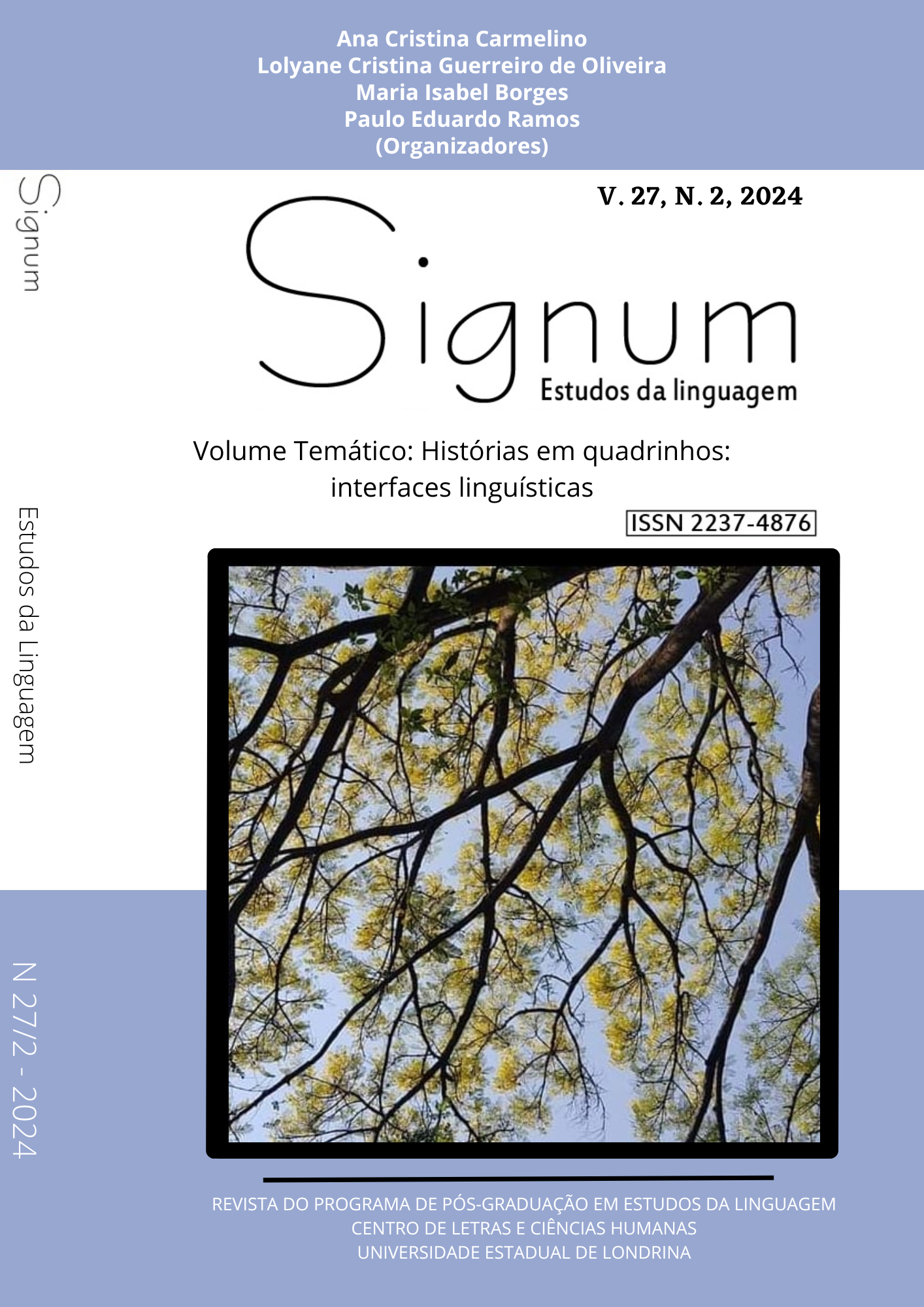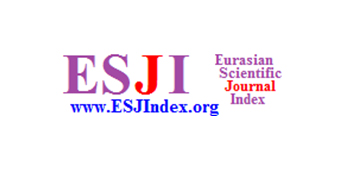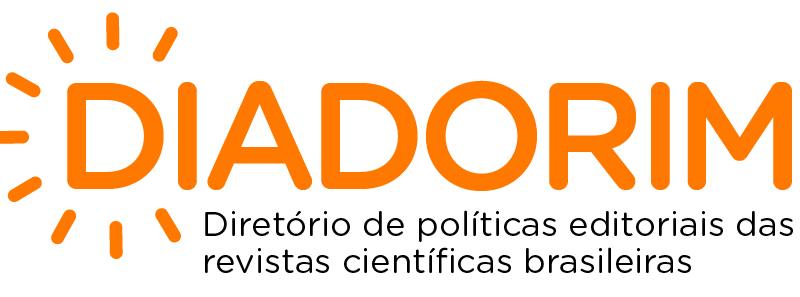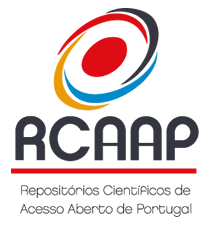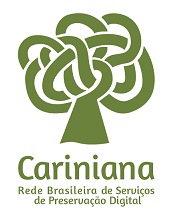Afrofuturismo en la adaptación secuencial de Kindred (2017)
DOI:
https://doi.org/10.5433/2237-4876.2024v27n2p14-26Palabras clave:
Afrofuturismo, Cómics, Kindred (2017)Resumen
La adaptación de la secuela Kindred (2017) narra las experiencias de la protagonista, Dana, frente a la esclavitud y el racismo, durante sus diversos viajes en el tiempo al Maryland del siglo XIX en los Estados Unidos de América. Este cómic es una adaptación de la novela afrofuturista homónima de la escritora estadounidense Octavia E. Butler de 1979, realizada por los dibujantes Damian Duffy y John Jennings. A través de representaciones interseccionales de género, poder y raza, ilustran de forma más vívida la violencia a la que se enfrenta Dana en una antigua plantación antebellum. Así, los objetivos de esta investigación fueron identificar los principales elementos afrofuturistas aplicados en la adaptación y comprobar cómo se utilizaron los recursos secuenciales tanto para intensificar la experiencia de lectura como para promover una adaptación más fiel (Cartmell, 1999). A través de la metodología deconstructivista (Derrida, 2010; Evans, 2020; Shaikh, 2022), identificamos un profundo revisionismo de las relaciones entre género, poder y raza. En consecuencia, este revisionismo ha dado lugar a una plétora de representaciones secuenciales sobre reinterpretaciones, reconstrucciones y reconciliaciones históricas. Los dibujantes no proponen olvidar el pasado, sino entenderlo como una entidad moderna.
Descargas
Citas
BLOOMFIELD, David. Reconciliation After Violent Conflict A Handbook. Handbook Series. Holmberg & Holmberg Design AB: Sweden, 2003.
BRAYBOY, B. M. Toward a tribal critical race theory in education. The Urban Review, 37 (5), 425-446, 2006.
BUROCCO, Laura. Afrofuturismo e o devir negro do mundo. Revista Arte e Ensaios, n. 38, julho de 2019. Disponível em: https://revistas.ufrj.br/index.php/ae/article/view/26373/15167 Acesso em: 04 mar. 2024.
CARTMELL, Deborah. Adaptations: From Text to Screen, Screen to Text, London: Routledge, 1999.
DERRIDA, J. Grammatology. London Routledge Press, 2010.
DONALDSON, Eileen. A contested freedom: The fragile future of Octavia Butler's Kindred. In: English Academy Review: Southern African Journal of English Studies, 31:2, 94-107, 2014.
EVANS, C. Strategies of Deconstruction: Derrida and the Myth of the Voice. USA: University of Minnesota Press, 2020.
FIELDER, T. Infinitum: An Afrofuturist Tale. Amistad: New York, 2021.
FOLKE, C., S. R. Carpenter, B. Walker, M. Scheffer, T. Chapin, and J. Rockström. 2010. Resilience Thinking: Integrating Resilience, Adaptability and Transformability. Ecology and Society 15 (4). Disponível em <http://www.ecologyandsociety.org/vol15/iss4/art20/>. Acessado em 16/01/2024.
FOUCAULT, M. A ordem do discurso. Universidade Federal de Goiás. Goiânia, 2004.
FREUD, S. O estranho. In S. Freud. Obras psicológicas completas de Sigmund Freud (J. Salomão, Trad.). Rio de Janeiro, RJ: Imago. (Obra originalmente publicada em 1919), 2020.
GODDARD, STACEY. Embedded Revisionism: Networks, Institutions, and Challenges to World Order. In: International Organization, 72 (4): 763-97, 2018.
HAWKING, Stephen. Uma Breve História do Tempo. Rio de Janeiro: Editora Intrínseca, 2015.
HOFSTEDE, G. Culture and Organizations: Software and the Mind. New York: McGraw-Hill Companies, 2007.
JEMISIN, N. K. Far Sector. DC Comics: New York, 2021.
JENNINGS, J.; DUFFY, D. Kindred: A Graphic Novel Adaptation. ‎ Abrams Comicarts, 2017.
MCGREGOR, D; BUCKLER, R; GRAHAM, B; LEE, S. Black Panther. Penguin Classics Marvel Collection: London, 2016.
MCNEESE, Tim. The Civil Rights Movement; Striving for Justice. Infobase Publishing, 2008.
SAID, E. Orientalism. New York: Vintage Books, 2010.
SCOTT, Astrada. Home and Dwelling: Re-Examining Race and Identity Through Octavia Butler's Kindred and Paul Beatty's The Sellout In: Journal of French and Francophone Philosophy Revue de la philosophie française et de langue française. Vol. XXV, N. 1, 2017.
SHAIKH, Hadi. Structuralism and Post-Structuralism. Philadelphia. University of Pennsylvania Press, 2022.
SIMMEL, G. Conflict and the Web of Group Affiliations. Trad. Kurt H. Wolff and Reinhard Bendix. New York: Simon and Schuster, 2010.
SUMMERS, Mark Wahlgren. The Ordeal of the Reunion: A New History of Reconstruction. Chapel Hill: University of North Carolina Press, 2015.
TEGMARK, M. Our Mathematical Universe: My Quest for the Ultimate Nature of Reality. Random House, New York, London, 2014.
THOMAS, C. D. Inheritors of the Earth. How Nature Is Thriving in an Age of Extinction. London: Allen Lane, 2017.
TUCKER, Aviezer. Historiographic Revision and Revisionism. Budapest: Central European University Press, 2008.
TYRRELL, Ian R. Historians in Public: The Practice of American History, 1890-1970. Chicago: U of Chicago P, 2005.
YOUNG, Iris M., in Global Challenges: War, Self-Determination and Responsibility for Global Justice. Responsibility, Social Connection and Global Labour Justice, Cambridge, Polity :160-186, 2007.
WIGGS, Kimber L. "The Trouble: Family, Genre, and Hybridity in Octavia Butler's Kindred." In: Mosaic: an interdisciplinary critical journal. Vol. 54 no. 1, p. 129-145, 2021.
WINDISCH, S., SIMI, P., BLEE, K., and DEMICHELE, M. Understanding the Micro- Situational Dynamics of White Supremacist Violence in the United States. Routledge: New York, 2018.
Descargas
Publicado
Cómo citar
Número
Sección
Licencia
Derechos de autor 2024 Carlos Eduardo de Araujo Placido, Dr. Nataniel dos Santos Gomes

Esta obra está bajo una licencia internacional Creative Commons Atribución-NoComercial-SinDerivadas 4.0.
Signum: Estudos da linguagem, publica seus artigos licenciados sob a Licença Atribuição-NãoComercial-CompartilhaIgual 4.0 Internacional. Esta licença permite que terceiros façam download e compartilhem os trabalhos em qualquer meio ou formato, desde que atribuam o devido crédito de autoria, mas sem que possam alterá-los de nenhuma forma ou utilizá-los para fins comerciais. Se você remixar, transformar ou desenvolver o material, não poderá distribuir o material modificado.
